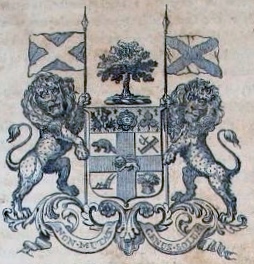Canada Company

The country does not alter the race
|
|
| Land Settlement | |
| Industry | Resettlement from Britain and Europe to Upper Canada |
| Fate | Dissolved |
| Founded | 6th Geo IV, c.75 |
| Founder | John Galt |
| Defunct | 1953 |
| Headquarters | England: No. 13, St. Helen's Place, Bishopsgate Street, London., Guelph, Upper Canada |
|
Number of locations
|
Huron Tract, Queen's Bush, Clergy Reserves |
|
Area served
|
Upper Canada |
|
Key people
|
John Galt, William Dunlop, Thomas Mercer Jones, William Allan, Daniel Lizars |
| Services | Land, roads, mills |
| Total equity | 2,000,000 acres (8,100 km2) of land |
The Canada Company was a large private chartered British land development company, incorporated by royal charter on August 19, 1826, under an act of British parliament. given royal assent on June 27, 1825, to aid in the colonization of Upper Canada. Originally formed to acquire and develop Upper Canada's undeveloped clergy reserves and crown reserves which, in 1827, the Company acquired for £341,000 ($693,000) from the Province of Upper Canada:
The Canada Company assisted emigrants by providing good ships, low fares, implements and tools, and inexpensive land. Scottish novelist John Galt was the company's first Canadian superintendent. He selected Guelph, Ontario as the company's headquarters, and proceeded to build a town there. The company surveyed and subdivided this massive area, built roads, mills, and schools and advertised it to buyers in Europe. The company then assisted in the migration of new settlers, bringing them to the area by means of a boat, which the company also owned, on Lake Ontario.
The company's mismanagement and corruption, and its close alliance with the Tory elites, known as the Family Compact was an important contributing factor to the Upper Canada Rebellion in 1837.
The formal structure of the Canada Company was put into place August 24, 1826 by the company Court of Directors. John Galt, as secretary, had the first order of business. Tabling an abstract of the charter, Galt declared the name to be “The Canada Company” with directors and secretary as served on the Provisional Committee and listed in the charter.
At the first meeting of the board, it was declared that four directors would rotate off the Company beginning in 1829.
Alexander Macdonell was a Roman Catholic Scotsman who accepted the government promise of 200 acres (0.81 km2) in Upper Canada to every soldier who emigrated. He had been the chaplain of a Catholic Scottish Glengarry regiment. Macdonell was a conservative legislative councillor from 1831 leading the mainly Irish settlers against the Reform movement and Mackenzie.
...
Wikipedia
